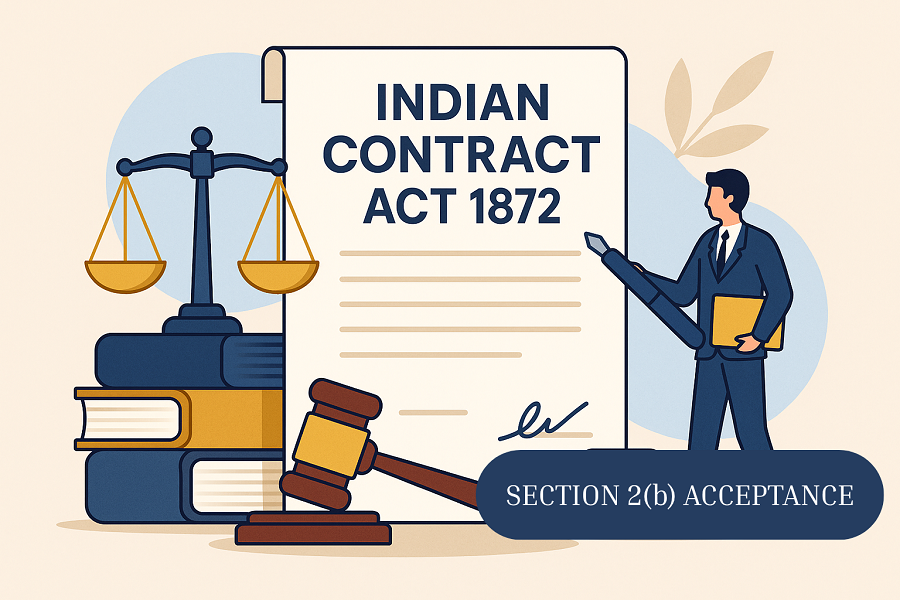INTRODUCTION OF ACCEPTANCE, COMMUNICATION OF ACCEPTANCE AND TIME LIMIT FOR REVOCATION
| Definition of acceptance | When the person to whom the proposal is made Signifies is assent Thereto The proposal is said to be accepted. | |
| Promise | In case of a specific offer | In case of a general offer |
| Only that particular person/group of persons to whom the specific offer has been made and none else. | Any person if – He has the knowledge of offer, and – He fulfils the terms and conditions of the offer | |
| Mode of acceptance | (a) Express acceptance (b) Implied acceptance | |
LEGAL RULES FOR A VALID ACCEPTANCE (Sec.7)
| Absolute & unqualified. | The offeree should assent to all the terms of the offer There must he ne variation / reservation acceptance unconditional | |
| Acceptance must communicated | The Acceptance cannot he made in ignorance of the offer. Mere mental acceptance is no acceptance. | |
| Acceptance to whom? | The acceptance must be communicated to the offeror. Felthouse v Bindles • F made an offer to his nephew to buy the nephew’s horse for Rs 500 • The offer stated that if the nephew failed to reply to the offer of F within 10 days, F shall consider that the horse had been sold to him. • The nephew directed his manager not to sell that horse to anybody since he wanted to sell that horse to F. But the nephew did not send any reply to F. • By mistake, the manager sild that horse to some other person • It was held that nephew was not bound to send notice of refusal to F Therefore, failure to send the letter of refusal within 10 days did not amount to acceptance •Also, nephew’s communication of decision to sell the horse of F did not result in a valid acceptance since such decision was not communicated to F, the offeror •Since there was no contract between F and the nephew, F had no right against the nephew. | |
| Acceptance by whom? | Acceptance must be given by the person who has the authority to accept the offer | |
| Manner of acceptance. | Situation (A): The offer does not prescribe the manner of acceptance | Situation (B): The offer prescribes the manner of acceptance. |
| The offer must be accepted in the some usual and reasonable manner | i) The offer must be accepted in prescribed manner. Ii) If the offer is not accepted in the prescribed manner, the offeror may approve or reject such acceptance | |
| Time limit for acceptance | Situation (A): The offer does not prescribe the time limit | Situation (B): The offer prescribes the time limit |
| The offer must be accepted within reasonable time | The offer must be accepted within prescribed time limit. | |
| Acceptance must be given before the offer lapses or revoked | a) Acceptance can be given only to an existing offer. b) An offer open for a limited period can be accepted only before the expiry of such specified period c) An offer can be revoked before acceptance | |
| Mode of acceptance | Acceptance may be given by • Performance of conditions, or • Acceptance of consideration. | |
COMMUNICATION WHEN COMPLETE (Sec. 4)
| Communication of Offer | Communication when complete? | |
| When the offer comes to the knowledge of the offers | ||
| Acceptance | Communication is complete against the offer | When acceptance is put in a course of transmission so as to be out of the power of the offeree |
| Communication is complete against the offeree | When acceptance to the knowledge of the offeror | |
| Revocation | Communication is complete against the person who make it’s | When revocation is put in course of transmission. So as to be but of the power of the person who makes it |
| Communication is complete against the person whom it is made | When revocation comes to the knowledge of the person to whom it is made | |
TIME LIMIT FOR REVOCATION (Sec. 5)
| Revocation of… | Time limit for revocation: |
| Offer | Before communication of acceptance is complete against the offeror. |
| Acceptance | Before communication of acceptance is complete against the offeree |









